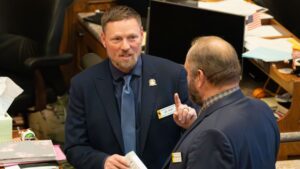By Randy Lioz
By now there are few truisms as accepted as the inevitability of the viciousness and incivility we see within discussions online. While I’m not much of a tweeter, I’ve heard that Twitter counts as the apex of this phenomenon. But really any of the most popular platforms contain surfeits of awfulness and hatred, and have even been shown to harm our mental health.
One of the major factors that allows Braver Angels to be so effective in our work is that our red-blue workshops are conducted face to face. Participants are not hidden behind the mask created by a computer or phone screen, and are able to register one another’s cues, both verbal and non-verbal, in real time. We’re confronted in no uncertain terms with the pure humanity of our conversation partner; we can hear the emotion in their voice and see the sincerity of their expression.
The social media mask exists despite our names being attached to what we write. Yes, in the back of our minds there may lurk the thought that this tweet could get me fired, but without the ability to see the impact it has on our targeted interlocuter, it feels all too remote and innocuous.
I talked to Bill Doherty, Professor and Director of the Marriage and Family Therapy program at the University of Minnesota, and Braver Angels’ lead workshop designer, a bit about these social media conversations.
“First of all, it’s an asynchronous conversation,” he said. These conversations take place on various time scales, and that can present an issue, since a response is often read by someone in a very different mindset than when they first wrote their missive. That delay often leads to further disconnection.
“Secondly, there’s often an audience…who can get in on it, can egg things on, can elevate misunderstanding to the level of accusations.” It seems to me that the audience can also have a powerful indirect impact, since it shifts the conversation towards the performative, rather than the purely interpersonal.
That can actually have countervailing effects, though, since because the conversation is more public, there’s a chance we might be more restrained in what we say. But let’s face it, public platforms are at least as likely to make us feel more bold, rather than less.
“There’s just so many uncontrolled factors,” Doherty lamented. With our workshops, there’s a very distinct structure, and the expectations are laid out quite clearly. Not only that, but there’s a moderator who can intervene in real time—they can interrupt people mid-sentence—if the temperature starts to rise too quickly.
Still, the world is not a Braver Angels workshop, and social media conversations about politics are with us for the long term. Yes, the most productive political conversations happen in person, but why not see if we can bring some more humanity to the digital word? In fact, maybe we can take advantage of some of the distinctive characteristics of this medium.
Last month, twin sisters Kasey and Kelly Jones, whom I met at a skills workshop in Paso Robles, talked on the Braver Angels member call about their experiences with being on the opposite side of the divide after having grown up with such a close relationship. They were at loggerheads for over a year, until they came to a sort of mutual understanding about each other’s beliefs.
When difficult things come up in the news, “We don’t really discuss it in person with each other,” said Kasey, “because it’s still better for us to think about our answers, and then get back to each other in a more nuanced way.” So they’ve been conducting a long-term text message conversation since getting over their post-election feud.
Certainly many thoughtful people find it helpful to take advantage of the time delay to let their own emotions cool before firing off a missive, and this pause is certainly available on social media.
“But I think also what we’ve learned to do is compromise,” added Kelly. “I think that’s what this organization is about, is listening to another perspective, and considering it. Imagining what it’s like to have that other perspective, and really being generous towards it, and I think that’s something that we have more skill at than we did initially.”
Indeed, when I asked Bill what element was most important for a productive online conversation, he emphasized having a “generosity of spirit” towards those with whom we disagree.
With that in mind, we’ve created a social media code of conduct for our pages and groups. And along with it we’re giving Braver Angels members the opportunity to make a social media pledge, to abide by this code, and to always bring their best selves to online conversations.
I was able to develop this code with the help of Braver Angels leader Steve Saltwick, and with the input of Doherty. You can find the code of conduct here.
We decided to craft the code in the form of an acronym, W.I.N.G.S., so that it’s easier to remember, and so that those who are abiding by it can be said to be “wearing their W.I.N.G.S.” And each principle outlined has some helpful examples of how to put it into practice, provided by Doherty.
At the bottom of the code you’ll see how you can take the pledge. If enough people start to display the frame around their profile photo, we can really spread the word about the Braver Angels message, and how it applies to social media.
And for those leaders who are running Facebook groups that would benefit from this code, like state or alliance groups, there’s a document available that lays out how to implement the code to ensure that anyone who joins your group will be on the same page in terms of what’s expected from them. You can reach out to me directly via email for that.
The social media landscape may be the Wild West of political conversation. But if we have some basic ground rules, and make an effort to bring our best selves to the discussion, it’s possible to raise the level of our discourse, and maybe provide an example that can start to move the needle—just a little bit—in the larger online conversation.




